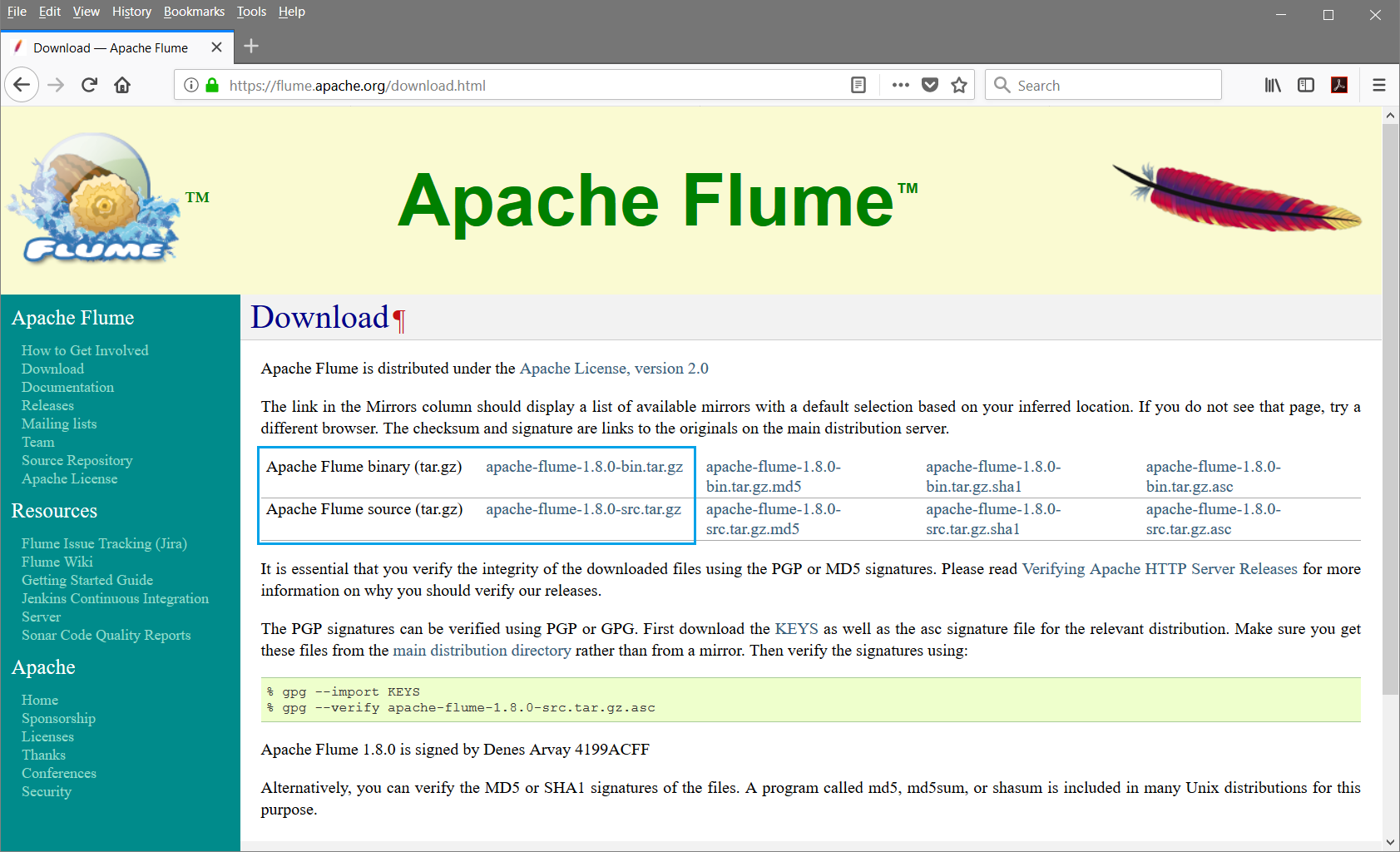Apache Flume Environment Setup
The below are the system requirements to install the apache Flume on the system.
System Requirements -
- Java Runtime Environment - Java 1.6 or later (Java 1.7 Recommended)
- Memory - Sufficient memory for configurations used by sources, channels or sinks
- Disk Space - Sufficient disk space for configurations used by channels or sinks
- Directory Permissions - Read/Write permissions for directories used by agent
Another requirement is, install Hadoop before proceeding with Flume installation. The Hadoop installation procedure can be found here .
Installing the Flume Tarball -
The Flume tarball is a self-contained package that had everything required to use Flume on a Unix-like system. Follow the below steps to setup Flume.
Step1:
Download Flume Tarball from the link:
https://flume.apache.org/download.html
Download both Binary and Source files from the above link.
Step2:
Click on apache-flume-1.11.0-bin.tar.gz and it will redirect it to mirror sites to download. Once the Binary download completed, click on apache-flume-1.11.0-src.tar.gz and it also will redirect to mirror sites to download.
Step3:
Create a directory for the flume. The directory will be created where the Hadoop and Habse installed. The directory can be created with the below command if it is not created.
$ mkdir Flume
Step4:
Unpack the flume in the downloaded directory.
$ cd Downloads/
$ sudo tar -zxvf apache-flume-1.11.0-bin.tar.gz
$ sudo tar -zxvf apache-flume-1.11.0-src.tar.gz
Step5:
Move to the unpacked ones to Flume directory created.
$ sudo mv apache-flume-1.11.0-bin.tar/* /home/Hadoop/Flume/
Flume Configuration -
Three files needs to be modified to configure Flume.
.bashrc
To complete the configuration of a tarball installation, the PATH variable must set to include the bin/ subdirectory of the directory where Flume installed.
$ export PATH=/usr/local/lib/flume-ng/bin:$PATH
Flume.Conf
Flume provides a template for the configuration files for flume.conf called conf/flume-conf.properties.template and a template for flume-env.sh called conf/flume-env.sh.template.
Copy the Flume template property file conf/flume-conf.properties.template to conf/flume-conf
$ sudo cp conf/flume-conf.properties.template conf/flume.conf
Edit the flume.conf to rename the flume-conf.properties.template file as flume-conf.properties and flume-env.sh.template as flume-env.sh
Flume-env.sh
copy the template flume-env.sh file conf/flume-env.sh.template to conf/flume-env.sh.
$ sudo cp conf/flume-env.sh.template conf/flume-env.sh
Edit the flume-env.sh file and set the JAVA_Home to the folder where Java was installed in your system.
Export JAVA_HOME=/home/Hadoop/java
Verifying the Installation -
Verify the installation by using the below command
$ flume-ng help
The command returns the similar to below.
Usage:
/usr/bin/flume-ng <command> [options]...commands: help display this help text agent run a Flume agent avro-client run an avro Flume client version show Flume version info global options: --conf,-c <conf> use configs in <conf> directory --classpath,-C <cp> append to the classpath --dryrun,-d do not actually start Flume, just print the command --Dproperty=value sets a JDK system property value agent options: --conf-file,-f <file> specify a config file (required) --name,-n <name> the name of this agent (required) --help,-h display help text avro-client options: --rpcProps,-P <file> RPC client properties file with server connection params --host,-H <host> hostname to which events will be sent (required) --port,-p <port> port of the avro source (required) --dirname <dir> directory to stream to avro source --filename,-F <file> text file to stream to avro source [default: std input] --headerFile,-R <file> headerFile containing headers as key/value pairs on each new line --help,-h display help text
Either --rpcProps or both --host and --port must be specified.
Note that the Flume-ng command should be in the $PATH where the flume installed.
